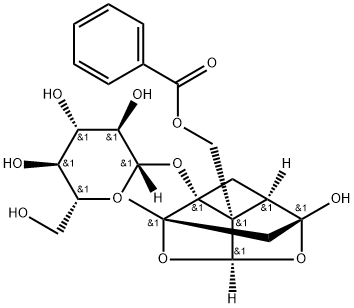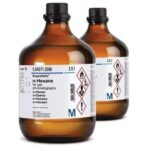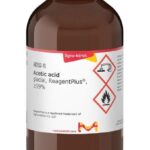| Paeoniflorin Basic information |
| Product Name: | Paeoniflorin |
| Synonyms: | 5beta-[(benzoyloxy)methyl]tetrahydro-5-hydroxy-2-methyl-2,5-methano-1h-3,4-dioxacyclobuta[cd]pentalen-1alpha(2h)-yl-beta-d-glucopyranoside;PAEONIFLORIN;5-alpha,5a-alpha,5b-alpha))-a-alph;5-methano-1h-3,4-dioxacyclobuta(cd)pentalen-1a(2h)-yl,(1ar-(1a-alpha,2-beta,3;White Peony Root P.E.;β-d-Glucopyranoside, 5b-[(benzoyloxy)methyl]tetrahydro-5-hydroxy-2-methyl-2,5-methano-1H-3,4-dioxacyclobuta[cd]pentalen-1a(2H)-yl, [1aR-(1aα,2β,3aα,5α,5aα,5bα)]-;beta.-d-Glucopyranoside, 5b-[(benzoyloxy)methyl]tetrahydro-5-hydroxy-2-methyl-2,5-methano-1H-3,4-dioxacyclobuta[cd]pentalen-1a(2H)-yl, [1aR-(1a.alpha.,2.beta.,3a.alpha.,5.alpha.,5a.alpha.,5b.alpha.)];Paeonia lactiflora P.E. |
| CAS: | 23180-57-6 |
| MF: | C23H28O11 |
| MW: | 480.47 |
| EINECS: | 245-476-2 |
| Product Categories: | Heterocycles;Natural Plant Extract;The group of Paeoniflorin;Steroids;API’s;Veterinaries;Inhibitors;Plant extract;reference substance;chemical reagent;pharmaceutical intermediate;phytochemical;reference standards from Chinese medicinal herbs (TCM).;standardized herbal extract |
| Mol File: | 23180-57-6.mol |
 |
| Paeoniflorin Chemical Properties |
| Melting point | approximate 124℃ (dec.) |
| Boiling point | 498.51°C (rough estimate) |
| density | 1.3044 (rough estimate) |
| refractive index | 1.5376 (estimate) |
| storage temp. | 2-8°C |
| solubility | Methanol (Slightly, Sonicated), Pyridine (Slightly) |
| form | powder |
| pka | 11.52±0.70(Predicted) |
| color | white |
| InChIKey | YKRGDOXKVOZESV-WRJNSLSBSA-N |
| CAS DataBase Reference | 23180-57-6(CAS DataBase Reference) |
| Safety Information |
| Safety Statements | 24/25 |
| WGK Germany | 3 |
| RTECS | RT1200000 |
| HS Code | 29389090 |
| Toxicity | LD50 ipr-mus: 9530 mg/kg YKKZAJ 89,879,69 |
| Paeoniflorin Usage And Synthesis |
| Chemical Properties | White powder |
| Uses | antiinflammatory, antispasmodic, antihypertensive, antidiuretic |
| Uses | Paeoniflorin is an active compound of the Paeonia root. Paeoniflorin inhibits Aβ25-35-induced mitochondrial dysfunction, which includes decreased mitochondrial membrane potential, increased Bax/Bcl-2 ratio, cytochrome c release and activity of caspase-3 and caspase-9. Paeoniflorin could attenuate or restore the viability loss, apoptotic increase, and ROS production induced by Aβ25-35 in SH-SY5Y cells. |
| Uses | Paeoniflorin is a herbal constituent extracted from the root of Paeonia albiflora Pall. Paeoniflorin has broad pharmacological effects, such as analgesic, anti-diuretic,anti-inflammatory,anti-convulsant, vasodilatic, and etc. In a study, paeoniflorin effe |
| Definition | ChEBI: Paeoniflorin is a terpene glycoside. |
| General Description | Paeoniflorin has been demonstrated to exert anti-inflammatory and immunomodulatory effects. |
| Biochem/physiol Actions | Herbal constituent of peony root. It is used in Chinese traditional medicine for its spasmolytic and pain-relieving properties. Exhibits anticoagulant, neuromuscular blocking, cognition-enhancing, immunoregulating, and antihyperglycemic effects. |
| Safety Profile | Moderately toxic by intravenous route. Mildly toxic by intraperitoneal route. When heated to decomposition it emits acrid smoke and irritating fumes. |
| Paeoniflorin Preparation Products And Raw materials |
| Raw materials | 2 3 4 6-TETRA-O-BENZYL-ALPHA-D-GLUCOPYR& |








